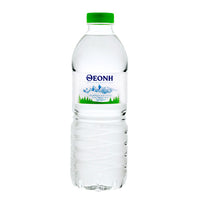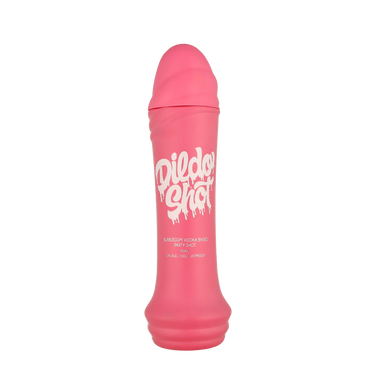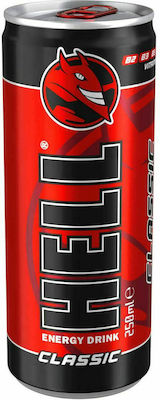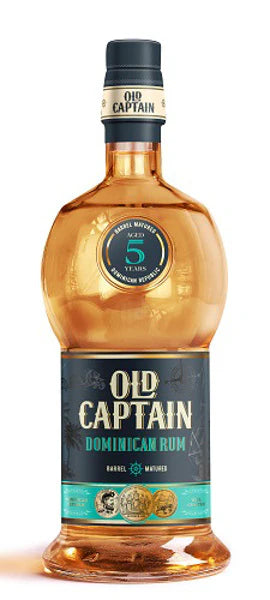

ΘΕΟΝΗ Φυσικό Μεταλλικό Νερό 500ml
€0,50
The bottled water "THEONI" is real spring water from the naturally sprouting springs of Goura, at an altitude of over one thousand meters. These springs are located in the forest...
The bottled water "THEONI" is real spring water from the naturally sprouting springs of Goura, at an altitude of over one thousand meters. These springs are located in the forest "Vatsounia" of Mouzaki Municipality of Karditsa. The springs in this region are part of Penios river water basin. Basic topographical data describing the terrain of the springs is in the elevation changes, the various slopes and creases.
The area of the springs for the "THEONI" water is in the western fringes of the "Itamos" mountain and the southern outskirts of the "Koziaka" mountain, which are part of the Agrafa mountain range.
The earthly sprouted (artesian water) springs of Goura at an altitude of over 1000 meters are also providing the drinking water of the residents of Vatsounia. The water source of Goura springs from their underground reservoirs never ends and a part of this is bottled by AHB Group SA, under the name "THEONI".
"Theoni" is, as it became known from the memories of the elders in the area, the name of the spring fairy in the region.
BOTTLED WATER OVERALL QUALITY
There are three types of bottled water recognized by the European Union: the table water, the natural mineral water and spring water. The label should not indicate any other classification of water (eg therapeutic, healing, natural water, mineral water or natural mineral water source). The table water is the aqueduct water bottled, it is the tap water in a bottle. No special features.
Natural mineral water
The natural mineral water has exclusively an underground source and is bottled on-site at their source. Community Directives prohibit any treatment or disinfection natural mineral water, as opposed to the table water. The underground source of natural mineral water, and the prohibition of any activity at a sufficient distance around the spring (the distance depends on the type of rock ground in the area), ensures the protection of any microbial load. In practice, the composition of the natural mineral water may be different from that of the public drinking water (table), eg be richer in various minerals and trace elements such as magnesium, calcium, potassium, etc.
The only treatment that allowed natural mineral water is the removal or addition of carbon dioxide, so the water is described as "naturally carbonated", "adding carbon dioxide "or" fortified with gas from the spring ", as appropriate.
Water source
the water source is close to natural mineral water in that it has definitely underground origin, firm texture, there is no decontamination process and is always bottled at its origin source. The spring water is rich in a mineral (eg magnesium, calcium) in order to qualify as content magnesium, calcium, etc. However, it is likely to see its "spring water" to an imported water, as the Greek bottled waters are either natural mineral or table.
Greek bottled water or imported?
Experts point out that Greek waters are of exceptional quality. The Greek natural mineral waters, in contrast with those from the rest of Europe are light in metal content. In Europe most natural mineral waters are rich in salt - so it is recommended to switch to consumption and not only the taste of a brand to avoid long-term accumulation of salts in the body. This does not apply to the Greek natural mineral waters, which, besides being light in metal content, they also have small differences between them, regarding to their content in minerals.
What good minerals are contained in the natural mineral water?
Natural mineral waters contain valuable minerals and elements trace, depending on their concentration, the water may be characterized, eg as magnesium, suitable for a diet low in sodium, calcium etc. It is indisputable that the minerals contained in natural mineral water (and the water table, and in many foods, especially fruits and vegetables) are necessary for the body and have a beneficial effect on health. The main constituents of natural mineral water, which are written on its label, are:
Na+ Sodium is one of the most important electrolytes that helps balance body fluids and participates in muscle contraction. However, excessive consumption of sodium is associated with hypertension, for the adjustment of which is recommended to be avoided. Any natural mineral water with sodium content of less than 10 mg / l may be mentioned on the label that it is "suitable for a low sodium diet."
K+ Potassium It is necessary to regulate the hydration of the cells and the maintenance of fluid balance in the body. It also helps in the transmission of nerve impulses (signals) between the neurons, and in muscle contraction.
Ca2+ Calcium is one of the most important metals as a key structural component of bones and teeth. At the same time, is involved in muscle function and transmission of signals between nerves. The calcium content in the water has good bioavailability (ie fully utilized by the body) and may contribute to the total daily intake of calcium.
Mg2+ Magnesium contributes to the proper functioning of muscles and nerves, and together with calcium contributes to the better functioning of the heart. At high concentrations, magnesium has a laxative and diuretic.
Cl- Chlorine tt is a component of hydrochloric acid in the stomach. Along with sodium helps maintain the fluid balance in our body.
HCO3- Dicarboxylic acid helps maintain the acidity of the digestive system and facilitates digestion.
SO4- Sulphate are components of cell membranes, enzymes and many of our organization.
Fe2+ Iron there are mainly in water passing through rocks rich in iron salts. Iron is a component of red blood cells responsible for carrying oxygen to the tissues. H Adequate intake contributes to the prevention of iron deficiency anemia.
Sio2 - Silica helps in the elasticity of the arterial walls.
The area of the springs for the "THEONI" water is in the western fringes of the "Itamos" mountain and the southern outskirts of the "Koziaka" mountain, which are part of the Agrafa mountain range.
The earthly sprouted (artesian water) springs of Goura at an altitude of over 1000 meters are also providing the drinking water of the residents of Vatsounia. The water source of Goura springs from their underground reservoirs never ends and a part of this is bottled by AHB Group SA, under the name "THEONI".
"Theoni" is, as it became known from the memories of the elders in the area, the name of the spring fairy in the region.
BOTTLED WATER OVERALL QUALITY
There are three types of bottled water recognized by the European Union: the table water, the natural mineral water and spring water. The label should not indicate any other classification of water (eg therapeutic, healing, natural water, mineral water or natural mineral water source). The table water is the aqueduct water bottled, it is the tap water in a bottle. No special features.
Natural mineral water
The natural mineral water has exclusively an underground source and is bottled on-site at their source. Community Directives prohibit any treatment or disinfection natural mineral water, as opposed to the table water. The underground source of natural mineral water, and the prohibition of any activity at a sufficient distance around the spring (the distance depends on the type of rock ground in the area), ensures the protection of any microbial load. In practice, the composition of the natural mineral water may be different from that of the public drinking water (table), eg be richer in various minerals and trace elements such as magnesium, calcium, potassium, etc.
The only treatment that allowed natural mineral water is the removal or addition of carbon dioxide, so the water is described as "naturally carbonated", "adding carbon dioxide "or" fortified with gas from the spring ", as appropriate.
Water source
the water source is close to natural mineral water in that it has definitely underground origin, firm texture, there is no decontamination process and is always bottled at its origin source. The spring water is rich in a mineral (eg magnesium, calcium) in order to qualify as content magnesium, calcium, etc. However, it is likely to see its "spring water" to an imported water, as the Greek bottled waters are either natural mineral or table.
Greek bottled water or imported?
Experts point out that Greek waters are of exceptional quality. The Greek natural mineral waters, in contrast with those from the rest of Europe are light in metal content. In Europe most natural mineral waters are rich in salt - so it is recommended to switch to consumption and not only the taste of a brand to avoid long-term accumulation of salts in the body. This does not apply to the Greek natural mineral waters, which, besides being light in metal content, they also have small differences between them, regarding to their content in minerals.
What good minerals are contained in the natural mineral water?
Natural mineral waters contain valuable minerals and elements trace, depending on their concentration, the water may be characterized, eg as magnesium, suitable for a diet low in sodium, calcium etc. It is indisputable that the minerals contained in natural mineral water (and the water table, and in many foods, especially fruits and vegetables) are necessary for the body and have a beneficial effect on health. The main constituents of natural mineral water, which are written on its label, are:
Na+ Sodium is one of the most important electrolytes that helps balance body fluids and participates in muscle contraction. However, excessive consumption of sodium is associated with hypertension, for the adjustment of which is recommended to be avoided. Any natural mineral water with sodium content of less than 10 mg / l may be mentioned on the label that it is "suitable for a low sodium diet."
K+ Potassium It is necessary to regulate the hydration of the cells and the maintenance of fluid balance in the body. It also helps in the transmission of nerve impulses (signals) between the neurons, and in muscle contraction.
Ca2+ Calcium is one of the most important metals as a key structural component of bones and teeth. At the same time, is involved in muscle function and transmission of signals between nerves. The calcium content in the water has good bioavailability (ie fully utilized by the body) and may contribute to the total daily intake of calcium.
Mg2+ Magnesium contributes to the proper functioning of muscles and nerves, and together with calcium contributes to the better functioning of the heart. At high concentrations, magnesium has a laxative and diuretic.
Cl- Chlorine tt is a component of hydrochloric acid in the stomach. Along with sodium helps maintain the fluid balance in our body.
HCO3- Dicarboxylic acid helps maintain the acidity of the digestive system and facilitates digestion.
SO4- Sulphate are components of cell membranes, enzymes and many of our organization.
Fe2+ Iron there are mainly in water passing through rocks rich in iron salts. Iron is a component of red blood cells responsible for carrying oxygen to the tissues. H Adequate intake contributes to the prevention of iron deficiency anemia.
Sio2 - Silica helps in the elasticity of the arterial walls.






